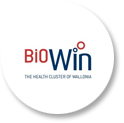
Guest blogger: Anne-Laure Languille
A study conducted by the firm M5 closely examined results obtained by BioWin, the health cluster of Wallonia. The conclusions state the positive impact of the cluster in four key domains: employment, investment in R&D, the financing of companies and their internationalization.
Funding innovation is a priority
Within days of the regional elections in Wallonia, this study, commissioned by the cluster itself, has all the air of a message addressed for politics. “We want to remind policymakers, who unanimously greet the action of our cluster, the need for priority funding of innovation on our territory,” explains Frédéric Druck, Director of International relations at BioWin, which gathers 120 companies, including 96 SMEs. Governed by a public-private board where GSK, UCB, and IBA stand, the cluster has to promote the creation of collaborative projects between businesses, universities and Walloon research centres. The key technological areas that are covered by BioWin include biopharmaceuticals, immunology, radiopharmaceuticals, cell therapy, in vitro diagnostics, medical technologies and services. Since its inception, the cluster has certified 32 R&D projects, each of which have received financing from the Government of Wallonia.
42,000 jobs
First conclusion of the study; cluster member companies create jobs. Between 2005 and 2012, they have created 6,552 jobs, nearly 1,000 new positions each year. A figure, certainly far from what the traditional industries of Wallonia could produce that public authorities replace by investing in the sectors of the future, but a figure encouraging for an ecosystem consisting essentially of small companies. Specifically, it is the 35 SMEs engaged in collaborative projects that have created the most jobs. “We had already noticed, across Wallonia, that innovative companies knew a better growth than the rest of the industry, and this study demonstrates that, within the biopharmaceutical industry, small firms which are practicing open innovation are basically growing more than their counterparts,” says Frédéric Druck. The cluster generates 42,000 direct and indirect jobs in Wallonia, in an area inhabited by 3.5 million. By comparison, the Rhône-Alpes region (in France), which has twice as many inhabitants, accounts for 100,000 direct and indirect jobs.
Fact – “Our companies have doubled their exports which are now reaching € 7.7 billion” Sylvie Ponchaut, Scientific Director of BioWin (listen to interview)

Wallonia distinguishes itself by its positive commercial balance. From 2005 to 2012, its companies have doubled their exports, which are now reaching € 7.7 billion, mainly towards the European Union, notes the study. “With a very limited domestic market, our companies start immediately abroad, analyzes Sylvie Ponchaut, Scientific Director of the BioWin cluster. To help, we have a ‘war machine’, that is AWEX,[Walloon agency for export, investment & trade – equivalent of UBI France], employing several hundred people. “The international relations department of BioWin is also funded by AWEX. Partnerships have thus been signed with the Juke Biotech Park (Shanghai China), the Massachusetts Life Sciences Center (Boston, Mass., USA), Lyonbiopôle and EuroBioMed (France) all of which are international relays for the members of the cluster.
Reaching technological maturity
If Wallonia is turned outward, it also invests within its territory. Representing nearly half of the R&D expenditures including the private sector, the Walloon biopharmaceutical industry conduits, approximately €800 million in investments each year.
Finally, the conclusions of the study are more mixed on the level of funding of the cluster company members. Despite a steady increase in fund raising, the SME members raised about €400 million between 2005 and 2013 with an annual average of €50 million, says the study. Aseptic Technologies, Odyssea Pharma and Uteron Pharma form the top 3 best-capitalized companies. BioWin, whose technologies are mature, now wants to attract financial and industrial investors abroad to consolidate the technological value chains in the region of Wallonia. Cardiatis, a medtech company, aims to raise between €10 and €15 million abroad to finance the deployment of its innovative stent. Now, BioWin is positioned as the key player of health innovation in Wallonia. Beyond its dedication to collaborative R&D projects, internationalization and trainings, the cluster will also advise businesses in their strategic choices. “We want to see new industrial capacities emerge, strengthen our ecosystems and create a critical mass in the areas that make us strong,” concludes Frédéric Druck.
Testimonial – Pascal Lizin, Director of external relations and public affairs for GSK:
“Sustainability of the cluster companies depends on two aspects: access to skills and funding. ”To meet the first challenge, we have developed a long-term vision of the needs of companies, including the regenerative medicine area, and launching the BioPharE project. It offers six innovative programs aimed at enhancing the employability of workers and the integration of young graduates and job seekers in the biopharmaceutical sector. Against the alienation of our youth for the engineering sectors, we also conduct awareness-raising for scientific careers. Second point, to avoid seeing our innovations go abroad for lack of funding in Wallonia, I call on policymakers to create incentives for investing Belgian savings in innovation”
Contact:























